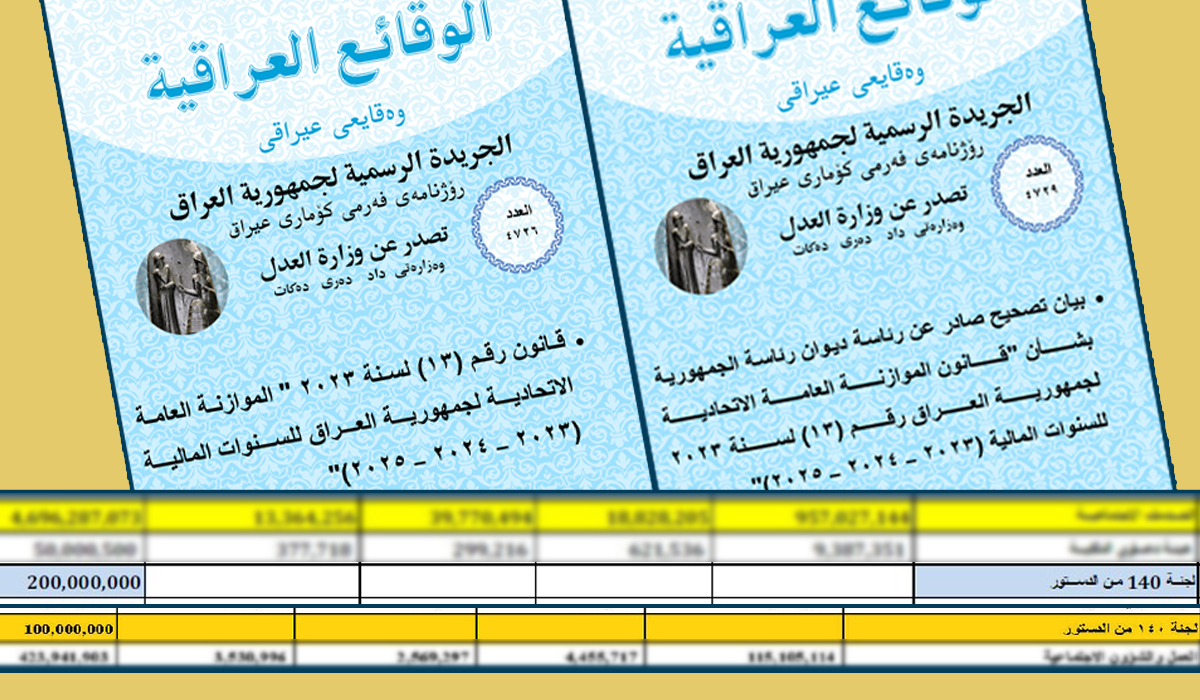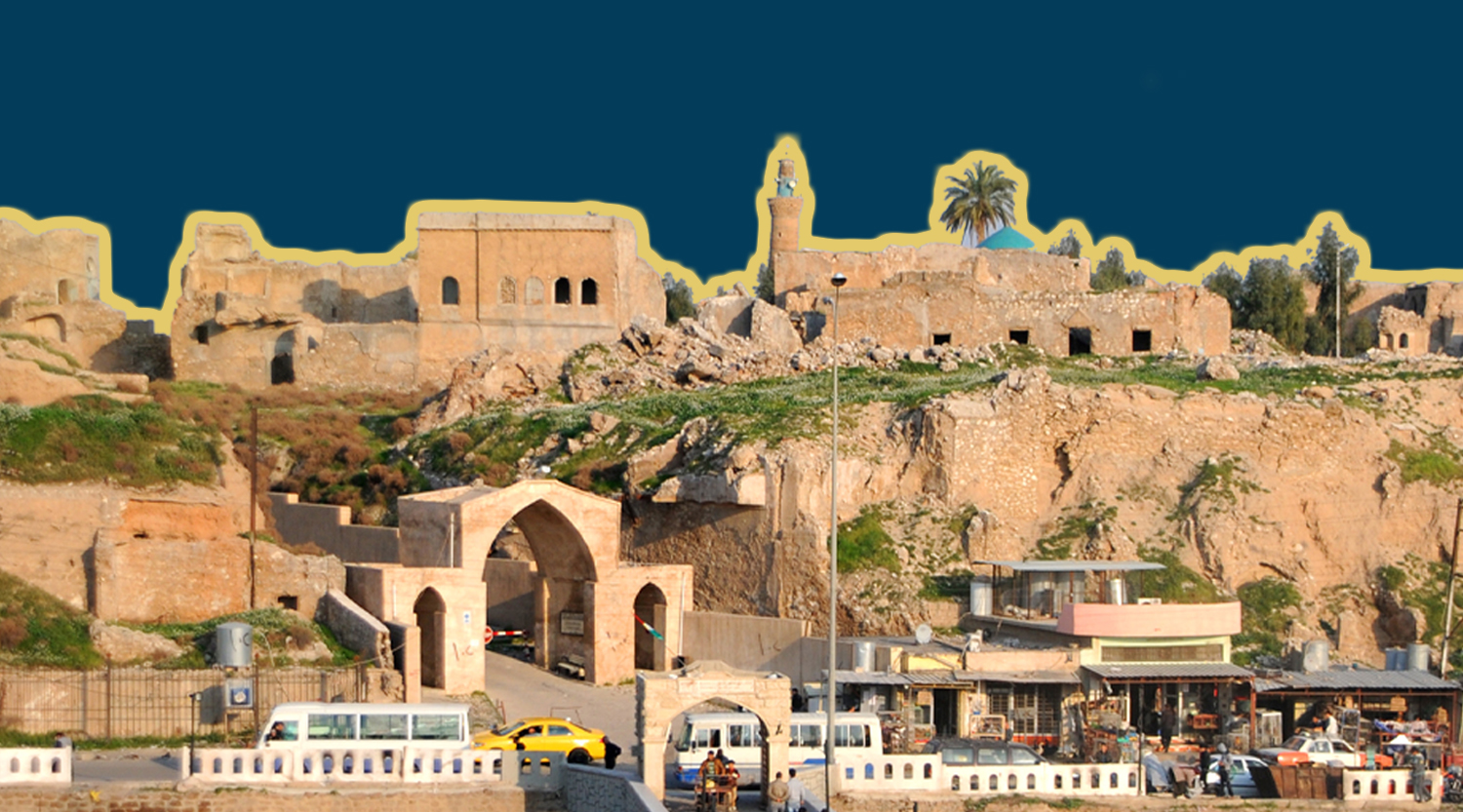The budget allocated for the implementation of Article 140 of the Iraqi constitution has been reduced from 200 billion Iraqi dinars IQD (USD150 Million) to 100 billion IQD, according to the correction of the federal budget law, at a time when the Kurdish lawmakers are making contradicting statements about this budget.
According to the correction of the general budget, the budget for Article 140 of the constitution amounts to 100 billion IQD, which was published on July 17, 2023 in the Iraqi Gazette No. 4729 after correcting typographical and linguistic errors, numbers and other information therein.
The budget of Article 140 is mentioned in Table F of the law regarding expenditures according to sectors and activities for the year 2023.
According to the same schedule of the General Budget Law, the budget of Article 140 was estimated at 200 billion IQD in the version published on June 26, 2023 in the Iraqi Gazette No. 4726.
Over the past five days, KirkukNow has contacted more than 10 deputies in the Iraqi parliament to get information about the amount of budget allocated for Article 140, but they were not in agreement about the amount of budget allocated.
Shakhwan Abdullah, the deputy speaker of the Iraqi parliament, said in response to a question by (KirkukNow) about the amount of the Article 140 budget that the budget is “200 billion dinars.” He stressed in more than a press interview this month that the Article 140 budget has been doubled from 100 billion IQD to 200 billion.
However, Nermin Maarouf, a member of the Parliamentary Finance Committee, insists that the budget for Article 140 is 100 billion IQD. She told (KirkukNow), “Basically, the allocated amount was 100 billion dinars, and it has not been increased in order to be reduced again.”
She affirmed no changes has been made in the budget law by their committe and it is not clear whether the same amount will be allocated for the coming years or not.
According to Article 140 of the Iraqi constitution, the fate of the disputed areas must be decided according to three stages that begin with normalization and then a census, provided that this is followed by a local referendum regarding their ownership, and this constitutional article is based on the implementation of the content of Article 58 of the Law of Administration for the Iraqi State for the Transitional Period, which was issued in March 2004 and consists of three main paragraphs.
So far, part of the first phase of implementing Article 140 has been implemented, which is to compensate the deportees from Kirkuk and the arrivals who were brought to Kirkuk from the central and southern governorates of Iraq.
Each deported family receives a compensation of 10 million dinars, while expatriates receive an amount of 20 million dinars after they are returned to their areas of origin.

The federal budget law that has been passed is for the years 2023, 2024 and 2025.
Muthanna Amin, a member of the Article 140 Committee in the Iraqi parliament, supports what Nermin said that the budget allocated for Article 140 for the year 2023 is 100 billion IQD, but he also told (KirkukNow), “The first time the decision was made regarding the budget, it was 100 billion dinars. After deliberations, it was decided, at the request of Parliament, to increase the budget to 200 billion dinars, but the decision has not been implemented so far.”
"It seems that the decision (an increase of 100 billion dinars) was not fixed during the transfers and the budget was not approved, or that the Prime Minister did not approve it, so it was not fixed," says Amin.
"100 billion dinars were to be transferred to the Article 140 budget within the six trillion of which the transfers take place, it may not have been approved or canceled, otherwise the budget would have been 200 billion dinars.”
This comes after the reactivation of the Supreme Committee for the implementation of Article 140 in accordance with the ministerial platform of new cabinet chaired by by Muhammad Shia'a al-Sudani, in addition to allocating a budget for it and disbursing financial dues to those covered by the article.
The Higher Committee for the Implementation of Article 140 was formed in 2006 and one of its tasks is to compensate the families who were deported from their areas and who were dispatched and relocated in the areas of deportees during the period of the rule of the previous regime (1968-2003).
The committee has offices in several governorates, and its work has stopped during the past years due to lack or lack of budget allocation for it.
Last year, due to the lack of approval of the budget law, no amount was spent for Article 140, but according to (KirkukNow) follow-up, 12.5 billion IQD were allocated in the budget law for the year 2021.
In 2020, the budget law was not approved, and in 2019, 50 billion IQD were allocated for the implementation of Article 140, and the budget law for the years 2017 and 2018 included the disbursement of 5 billion dinars only for the article.
Fahmi Burhan, head of the Kurdistan Regions Authority outside the administration of the Kurdistan Regional Government KRG, indicated in a statement he made to the media that the budget of Article 140 was 100 billion and has become 200 billion dinars.
Najwa al-Kaka’i, a representative from the Kirkuk governorate in the Iraqi parliament, told KirkukNow, “The budget of Article 140 of the constitution is 200 billion dinars for the three fiscal years 2023, 2024, and 2025, and this amount will be disbursed.”
On July 23, 2023, the Kurdistan 24 Media Foundation stated in a news article by the Kurdistan Regional Government that "in the first stage, an amount of 200 billion dinars was allocated to compensate citizens" within the framework of Article 140 of the constitution.
In 2019, the Iraqi Federal Court ended the controversy over “the enforcement of Article 140” and stressed that the article should be activated until all procedures related to that article are implemented.
In the middle of last May, the names of 100 families returned to obtain compensation within the framework of Article 140.
In Kirkuk governorate alone, more than 54,000 displaced and expatriate families received compensation certificates within 10 years, according to the statistics of the Supreme Committee for the Implementation of Article 140 of the Iraqi Constitution, and there are still thousands who have not received compensation.
According to official statistics for the years 2007 to 2012, over 136,000 forms were returned to the Office for the Implementation of Article 140 in Nineveh Governorate, with its main headquarters in Sinjar district.
Resolving the fate of the Kirkuk governorate and more than 11 administrative units within the borders of the governorates of Nineveh, Diyala and Salah al-Din depends on the application of this article.
Amin said, "It has not yet been decided how to spend the budget for Article 140, but the bulk of it will be to compensate those covered by the article. Those who were not compensated will be paid."
The member of Committee 140 in the Iraqi parliament says that the budget allocated for the article for the next three years is not fixed and changes every year.
In the period from 2016 to the end of 2023, more than 292 billion dinars were allocated to the Supreme Committee for the implementation of Article 140.





